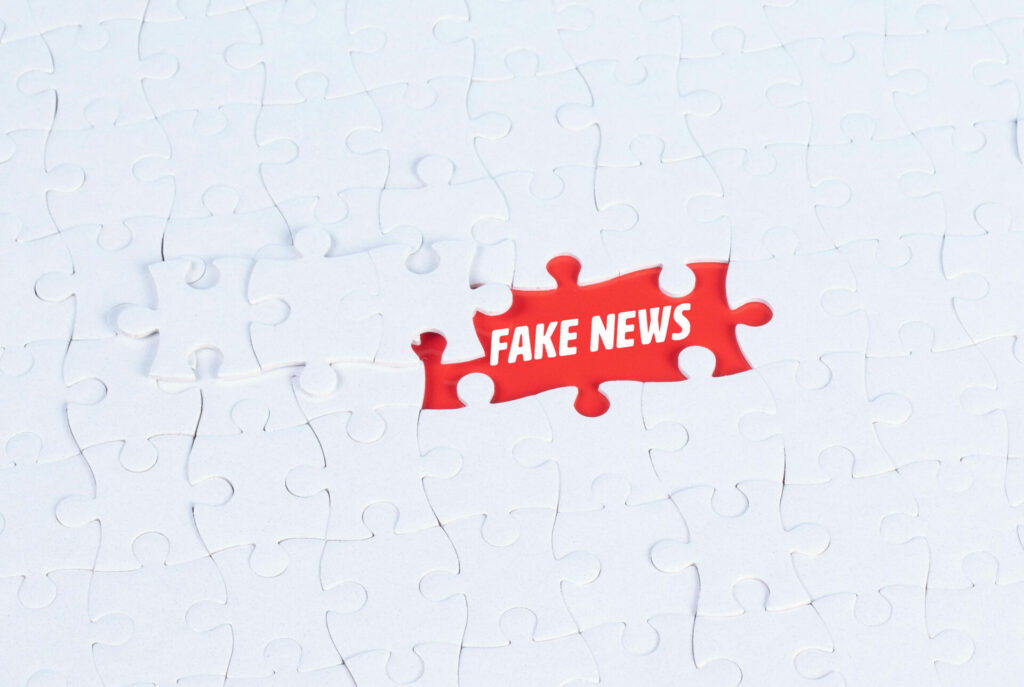Misinformation in action: Fake news exposure is linked to lower trust in media, higher trust in government when your side is in power

One major concern about fake news is that it could damage the public trust in democratic institutions. We examined this possibility using longitudinal survey data combined with records of online behavior. Our study found that online misinformation was linked to lower trust in mainstream media across party lines. However, for moderates and conservatives, exposure to fake news predicted a higher confidence in political institutions. The mostly right-leaning fake news accessed by our moderate-to-conservative respondents could strengthen their trust in a Republican government. This was not true for liberals who could be biased against such content and less likely to believe its claims.
RESEARCH QUESTIONS
Is exposure to fake news sources associated with lower trust in mass media?
Is exposure to fake news sources associated with lower trust in political institutions?
ESSAY SUMMARY
We collected data from U.S. respondents (N=3000) who participated in two survey waves conducted a month apart from each other. The surveys were sent out in late October and late November of 2018, shortly before and shortly after the U.S. midterm elections.
Participants were also asked to install a browser extension tracking their online behavior during the time period between the surveys. About 8% (N=227) of the respondents agreed.
The browsing history of participating respondents was used to evaluate their exposure to fake news sources and assess whether consuming misinformation was linked to changes in trust.
We found that fake news exposure was associated with a decline in mainstream media trust among respondents.
Our results also showed that fake news exposure was associated with an overall increase in political trust, and especially trust in congress and the justice system.
Upon examining that relationship more closely, we found that fake news consumption was linked to lower political trust, but only for strong liberals. For moderates and conservatives, fake news consumption predicted higher trust in political institutions.
Our findings confirm that the consequences of fake news cannot be examined in isolation. To effectively anticipate the implications of misinformation spread, research needs to consider the current media and political environment.
Implications
The long-standing problem of political misinformation drew public attention in the aftermath of the 2016 U.S. presidential election. Scholars, journalists, and politicians expressed alarm that the spread of fake news could destabilize political institutions and delegitimize media organizations. Despite those widespread concerns, there is relatively little research exploring the consequences of fake news consumption in the current political environment. Even though its direct electoral impact in 2016 may have been limited (Allcott & Gentzkow, 2017), online misinformation could have other important effects on our society.
In this work, fake news is defined as fabricated information that has the format of news content but not the editorial standards and practices of legitimate journalism (Lazer et al, 2018). Consumption of fake news makes people more likely to adopt various political misperceptions (Guess et al., 2020) that can affect their subsequent behavior, including voting decisions (Weeks & Garrett, 2014).
This work examines the potential of misinformation exposure to erode public confidence in key social institutions. We find evidence linking exposure to misinformation with trust in mainstream media and the federal government. Attitudes towards those institutions can, in turn, affect how people find and evaluate information; who they believe and how they act during exigent circumstances; as well as how they participate in the political process. Our findings thus emphasize the critical importance of technological, social, and regulatory efforts to curb the spread of fake news.
While this study has limitations, it showcases a novel approach to understanding the connection between fake news exposure and public opinion. The combination of longitudinal survey data and browser records provides a practical way to capture the complex interdependencies between individual attitudes and online behavior (see also Guess et al., 2020).
Media trust
In recent years, mainstream news organizations have experienced a considerable decline in public confidence (Newman, Fletcher, Kalogeropoulos, Levy, & Nielsen, 2018). The consequences of this lack of trust are especially apparent in times of crisis and uncertainty when citizens are most in need of credible sources providing current and reliable information. To the extent that fake news can undermine the public’s confidence in mainstream media, it may not only leave its consumers misinformed, but also make them more vulnerable when disaster strikes.
The content of false news stories can influence our confidence in the media. Cynical coverage and tabloid-style focus on scandal can erode citizen trust in news organizations (Hopmann, Shehata, & Stromback, 2015; Ladd, 2012). Those are characteristics typical of many fake news stories as their producers aim to increase audience engagement through sensational and divisive content.
Fake news can also discredit the press directly by accusing them of bias, complicity, and incompetence – or indirectly by contradicting a range of claims made by mainstream media. What is more, the very existence of online misinformation resembling a journalistic product can diminish the credibility of legitimate news. Confirming the relevance of those concerns, our study offers evidence that exposure to fake news is associated with a decline in the media trust of respondents.
Political trust
The impact of fake news on political trust has important consequences for our democracy. Public confidence in political institutions affects civic and electoral behavior, with distrustful citizens more likely to sit out an election or vote for a populist candidate (Hooghe, 2018). While in some cases concerns about poor government may lead to citizen mobilization, high levels of cynicism and mistrust can cause people to withdraw from participating in politics.
Research suggests that negative or biased reporting can reduce political trust and increase cynicism and apathy (Kleinnijenhuis, van Hoof, & Oegema, 2006). Similar considerations may apply in the case of fake news. Politically motivated fringe groups and foreign actors are said to spread misinformation mimicking the format of journalism specifically for the purpose of destabilizing democratic institutions (Wardle & Derakhshan, 2017). Financially motivated fake news outlets produce sensational content often aiming to generate more views by appealing to partisan bias, triggering negative emotions, and fueling political arguments. Scandal and incivility in current affairs coverage can draw and hold public attention while at the same time lowering political trust (Bowler & Karp, 2004; Mutz & Reeves, 2005).
Based on its characteristics, many observers expect that fake news is eroding political trust. Some sources of misinformation, however, can be portrayed more accurately as working to shift trust from mainstream institutions to fringe organizations, or from one political entity to another. While a citizen decline in political trust can be harmful, an unwarranted increase in public confidence based on false stories would be similarly problematic. An unrealistically optimistic view of the government, for instance, can be dangerous if it convinces citizens that no further action or mobilization is needed.
In this work, we take steps towards unpacking the complicated relationship between consuming fabricated content and trust in political institutions. We observe that fake news is linked to a decrease in political trust among liberal respondents, but it is associated with an increase in political trust for moderates and conservatives. These findings highlight the importance of considering the current political context when examining the impact of misinformation. Whether fake news does erode public trust in political institutions is likely determined by the ideological lean of the news sources, the individuals who access them, and the current political elites running the country. Key characteristics of the content itself could also shift over time, changing its impact on public trust.
Findings
This study set out to investigate the impact of fake news consumption on confidence in democratic institutions. Combining two-wave survey data with records of online behavior, we examined the role of misinformation exposure (a binary variable) as a predictor of trust in the media and the political system. While a single fake news encounter may not affect attitudes, here we treat it as a signal that the respondent consumes at least some misinformation. It indicates that the person has visited one of the sites on our fake news list using the browser we track (see Appendix A). Given that people tend to use multiple browsers and devices, and that there are sources of misinformation we have not yet identified, it is likely that our methods underreport the actual fake news exposure of participants.
Finding 1: Consuming misinformation was associated with a general decrease in media trust.
Fake news sources often target mainstream media organizations by accusing them of bias and incompetence. Perhaps more importantly, sensational and made-up stories that mimic the format of journalism could damage the credibility of all news content. With that in mind, journalists and scholars have expressed concerns that exposure to fabricated news would reduce people’s confidence in the press. Our research found evidence confirming that assumption. Misinformation exposure during the one-month period around the 2018 election did predict a 5% decrease in media trust among our participants. Furthermore, consuming fake news was associated with lower mainstream media trust across all levels of political ideology.


